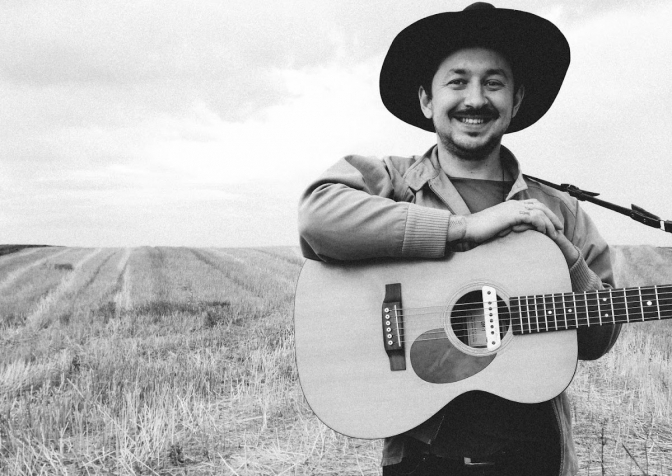
[Listen on YouTube to an eight minute podcast with Sasha Boole: Why Does Music Matter?]
By Joe Lindsley
When I first heard Sasha Boole’s song «Music to Watch the World Dying,» I thought he might have been from Texas or Tennessee or the Appalachian mountains of North Carolina. His English songs, which I discovered while listening to Spotify’s Discover Weekly, were dark, existential, and honest, whether about the tricks of politicians, who’s gonna post on your Twitter when you die, or a general sense of gloom descending.
But actually he’s a Ukrainian singing against the bleakness of what he calls post-Soviet mentalities which he experienced intensely as a kid growing up in the ‘90s and which he believes still linger in some sectors of Ukrainian life.
[To listen to Boole’s music on Spotify while reading, click here.]
«Most people say music came out of love but in my case music came out of hatred, all this post-Soviet surrounding,» he said, laughing, in our interview. We talked on the cobbled, car-free street outside of the café Fatset (Фацет / «Cool Guy»), before his show at Fest Republic’s Coffee, Books, and Vintage festival in early October. When I asked him why he has so many songs in Ukrainian and English about death and doom, he said:
«I think because I am feeling that the world is dying slowly. One of the biggest sources of my inspiration is wild nature. I am really in love with wild nature. In some ways I find God in wild nature.»
Boole, wearing an American style cowboy hat and boots, told me he’s got a house in western Ukraine’s Dniester River canyon, a wild and beautiful place, «a land [historically] with no kings and queens, [just people] looking for their happiness, risking their lives.»
[Read more: By the Riverside: Two Days at the Dniester Canyon]
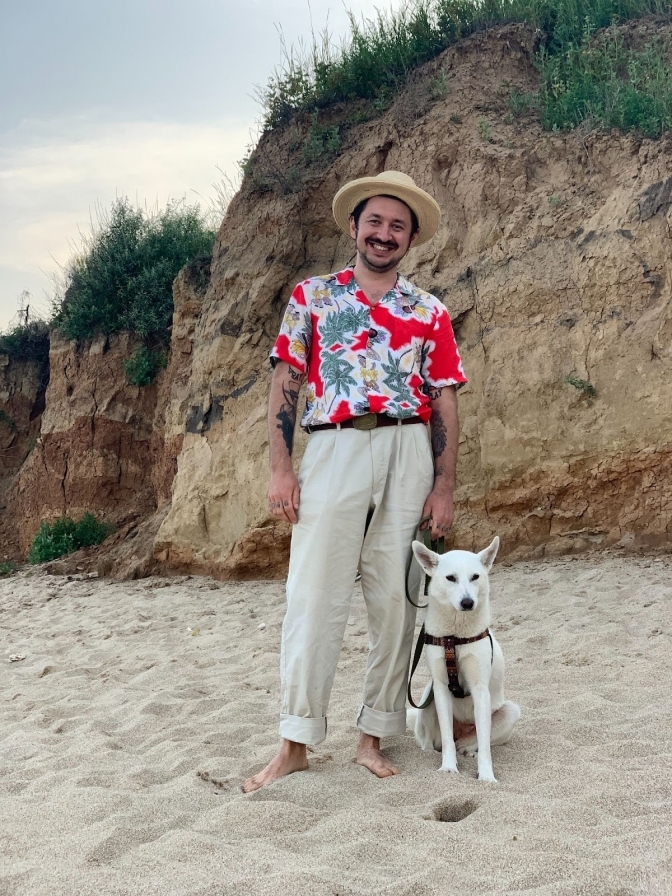
He knows well the history of the place, talking about how it once was the «wild west» borderlands between Europe and Ottomans, a place once filled with a mixture of those cultures and their architecture.
«But obviously everything was destroyed by the [****] Soviets,» he said with laughter and using a Polish bad word common among Ukrainians, whose own language does not have such words. There’s a strain in his talk and his songs about the evils of the Soviets.
His grandfather, «who was completely against the Soviets,» had told stories of how he smuggled vinyl records into Ukraine during the communist times.
«If they caught you with jazz music or blues music or rock n roll you could go to jail. They called it kneeling in front of western culture.»
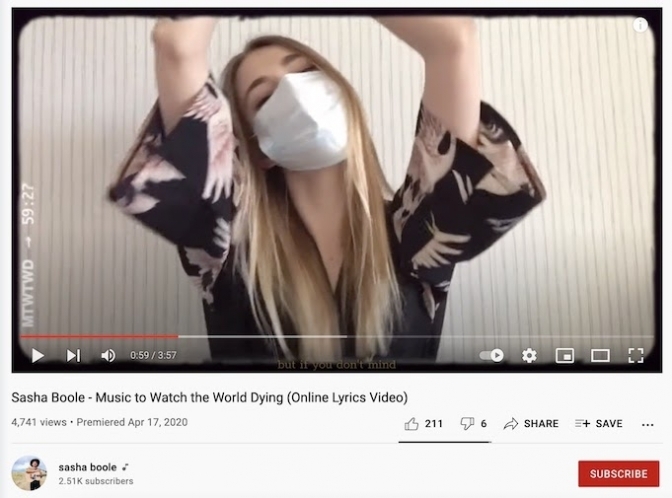
A screenshot from the music video of «Music to Watch the World Dying,» with masker-wearers watching and dancing from isolation.
Born in 1989 while his father was serving the USSR in Mongolia, Boole started listening to Delta blues and American folk in the 90s and early 2000s: Skip James, Muddy Waters, Waylon Jennings, Townes Van Zandt, Guy Clark, etc.–and Hank Williams, whose image is tattooed on his arm.
«It was the moment when I figured out something is wrong with all this story,» he said of his musical awakening. «We were living in a kind of weird world which is pretty artificial and they are trying to hide something from us and so I tried to dig this kind of music, listening to a lot of blues, folk music, and going deeper, deeper, and deeper... and that’s how I found a lot of inspiration. It was fresh air for me, in these post-90s surroundings.»
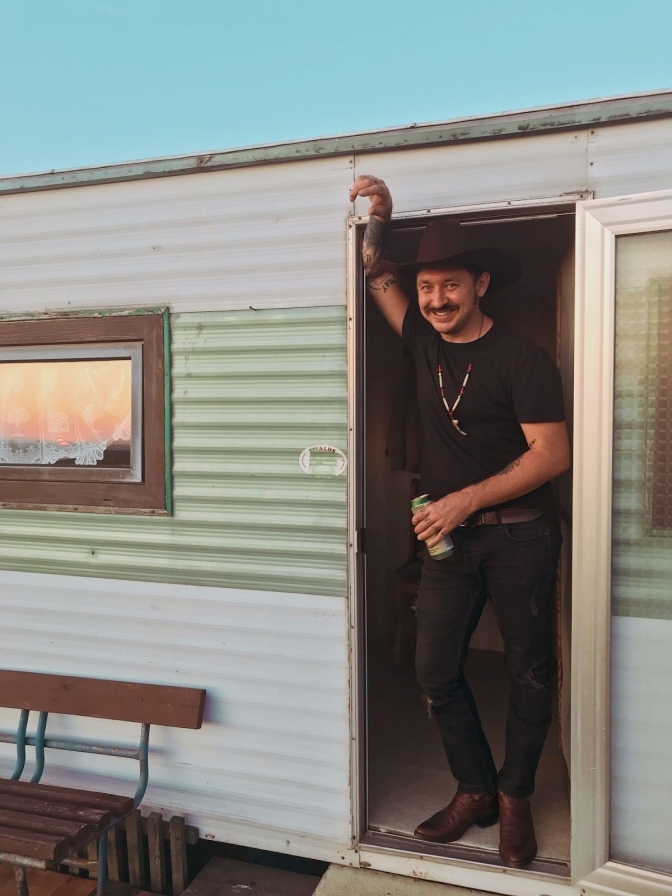
But while he criticizes much of the modern world, he also said, «from one side I don’t like when kind of left wing guys tell you, yeah lets fight the capitalism» – he he offers a jovial sarcastic laugh–»come on guys you tried once, and what happened, you created the monster!»
Although Boole draws much inspiration from American folk and blues, he says that before the soviets, Ukraine had a tradition of storytelling folk music: «The guys with the hurdy gurdy, they were storytellers, they were mass media in a way. They were traveling around the country sharing the news of the world with the people but the Soviets also worked to vanish them.»
And so Boole is on what he calls «some kind of mission and also revenge. By trying to share this kind of western values I am feeling that I am slowly putting another nail in the coffin of this post-Soviet mentality.
Despite the concerns about corruption and Russian cultural influence, Boole, when I asked him, said he sees great strengths in modern Ukrainian culture.
«The strongest part of Ukrainian society is not like in Russia or Belarus,» he said. «[Here] this society will never let the government – we have a really high degree of freedom after Euromaidan, especially. People felt this kind of thing. We don’t have this kind of fear in front of the guy in the uniform. In Russia, Belarus, when policemen tell people ‘stop,’ they’re stopping. and in Ukraine,» here he laughs, «they are arguing, they are like dude, ‘let’s figure this out.’»
And now, a Cormac McCarthy-esque novel
In the pandemic, Boole, who is based in the city of Chernivtsi, took refuge in his Dniester Canyon home. Inspired by the local village life, and by his love for American novelist Cormac McCarty he wrote a novel of his own, ПЛЮЩ (Ivy), with release this month by Kyiv publisher Luta Sprava («Fierce Business,» created in the wake of Euromaidan). Via QR codes, his music is embedded throughout.
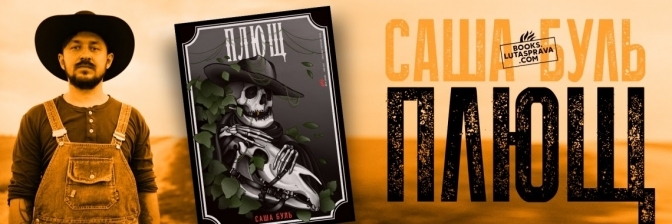 Sasha Boole’s book, Ivy (from the publisher’s website)
Sasha Boole’s book, Ivy (from the publisher’s website)
His characters are the «kind of people that will survive if something big will happen.» Even in the pandemic their lives haven’t changed. «‘So what if the bus is cancelled?’ they say. ‘We don’t have the money for the bus.’»
«If everything will be gone, we [people from the city] will be [%#%$^%&], paying for everything with their phones, peek peek peek,» he says, mimicking someone pushing a phone mindlessly. «But these people will know what to do.»
Texas foot-stomping and hollering in Lviv
Boole, with guitar and harmonica, sings in both Ukrainian and English, sometimes mixed, such as «Billy Boy.» There’s the gentle, wistful «By the Sea» and the rebellious, angry «Mankind As It Is,» both songs accented by soulful and melodious female harmony. At the Coffee, Books, and Vintage Festival some fans who had clearly heard his music before were stomping, swaying, and singing along, unbridled. In one song about werewolves – bringing a Carpathian vibe to western music – he got the crowd howling and even one dog in attendance joined in.
«This is Ukrainian Texan music, proper,» gleefully said a Texan who was in attendance.
You can listen to his music on Spotify and you can follow Sasha Boole on Instagram.
By Joe Lindsley (follow on Instagram or LinkedIn)
To receive our weekly email digest of stories, please follow us on Substack.
Lviv Now is an English-language website for Lviv, produced by Tvoe Misto («Your City») media-hub, which also hosts regular problem-solving public forums to benefit the city and its people.




